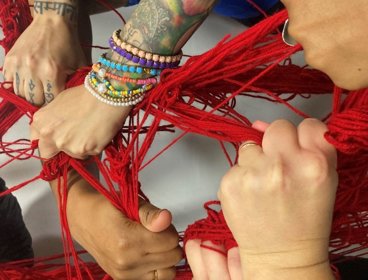By Sarah Mills, Loughborough University, Matt Baillie Smith, Northumbria University, Bianca Fadel, Northumbria University, Moses Okech, Makerere University
One of the most rewarding aspects of doing and communicating your geographical research is to work with community and voluntary groups. This was an important part of our own research which examined the lives of young refugees in Uganda and the role of volunteering for their livelihoods. As part of a wider international and collaborative project, we explored the relationships between volunteering, skills and employability for displaced young people. This work is important as forced displacement is a significant global challenge affecting millions of people worldwide. Uganda hosts around 1.5 million refugees, most of whom are children and young people. It is crucial that we understand the socio-economic inequalities young refugees experience and how these can intersect with diverse forms of volunteering, a popular activity and often a source of income within communities. There are a range of important considerations for researching refugee youth in different contexts (Huizinga et al., 2022), including any engagement with community and voluntary groups.
We engaged with these groups and relevant communities from the outset. We established youth advisory boards in each of the four sites for our mixed methods fieldwork and formed a wider stakeholder advisory group. We worked with young refugees to co-produce a definition of volunteering prior to designing our large-scale survey and series of interview guides. We also provided opportunities to collaborate, especially within our photovoice activities and workshops. We have learnt that it is essential to anchor geographical research within the community of practice. In our research, we worked collaboratively with civil society organizations that often engage young refugees as our partners from whom we drew valuable knowledge on successful community engagement approaches.
We have also communicated our research findings and recommendations to a range of community and voluntary groups in Uganda and beyond via a series of resources in different languages. These have included policy briefings and presentations, but also three interactive games and a photo exhibition. We believe visual and creative tools are important for communicating geographical research to these audiences in accessible ways, prompting people to actively engage with the evidence (sometimes without even realising they are doing it). By drawing upon data and findings from the project in Uganda, we can share new knowledge that can potentially shape people’s understanding of a topic in a different setting. This requires us to recognise that our findings may be challenging for some stakeholders. It is also important to keep in mind the ways in which evidence from your research might be used to inform policy-making processes in the sector. As part of our research in Uganda, we developed key recommendations for stakeholders working with volunteers to address barriers to refugee participation, provide recognition and development of young refugees’ skills, and promote volunteering in ways that reflect the realities of skills acquisition and employability amongst refugees.
It is important to take the time early on in a research project to carefully map the landscape of your research topic and potential case studies, especially if there are local community groups that have a long record of work in this space. These could be key contacts to engage with throughout your research and communicate your research findings too. We would recommend reaching out to them at an early stage to consider any opportunities for collaboration or reciprocal support, and also to identify if your research might cause any challenges for those actors. You should also reflect on the difference between, and ethics of, doing research on community and voluntary groups and doing research with community and voluntary groups. It is crucial to outline your involvement in any voluntary and community spaces and follow institutional and funder ethical guidelines. This is especially important if you are engaging with community and voluntary groups that support vulnerable populations, such as refugee youth.
We would encourage you to work with voluntary and community groups if appropriate within your research. Your findings and insights will reach new and important audiences. But you will also likely gain connections that enrich the experience of doing research and help you build your networks.
This study was supported by the UK’s Global Challenges Research Fund (GCRF) and Economic and Social Research Council (ESRC) [Grant number: ES/S005439/1, “Skills acquisition and employability through volunteering by displaced youth in Uganda”].
Summary
-
Carefully reflect on who might be an appropriate community or voluntary group to work with during your research project and how you will engage with them in ethical and reciprocal ways.
-
Do not assume that voluntary and community groups will have the capacity or time to engage with your research, even if they are interested in it. Try to be empathetic and understand the pressures and commitments they have.
-
Communicate with them throughout the research process and, if possible, provide them with opportunities to shape research design, analysis and communication. Always acknowledge partners and collaborators (funded or unfunded) in your research activities, especially at the end of the project if you have committed to producing outputs.
-
Consider producing different types of outputs from your research that might be relevant to different audiences, from one-page summaries to visual outputs that can communicate your academic findings in accessible and creative ways.
References
- Huizinga, R., Hopkins, P., De Backer, M., Finlay, R., Kirndörfer, E., Kox, M., Bastian, J., Benwell, M.C., Felten, P., Haack, L., Hörschelmann, K., and van Liempt, I. (2022) Researching refugee youth. London, UK: Royal Geographical Society (with the Institute of British Geographers). https://doi.org/10.55203/VCAT7733
How to cite
Mills, S., Smith, M. B., Fadel, B., and Okech, M. (2023) Working with refugee youth. Working with voluntary and community groups. Royal Geographical Society (with IBG) Guide. Available at: https://doi.org/10.55203/UOAI1160
About this guide
Working with voluntary and community organisations for some is a very important way to do geography. These organisation come in various shapes and sizes and may also often be referred to as the third sector, the voluntary sector, not-for-profit organisations, community groups or the civic sector. In this guide, we share the experiences of researchers doing geography in collaboration with community and voluntary organisations. A range of topics and issues are explored from health, disability and care, through to austerity, violence, and craft, amongst others. We learn about the approaches taken by geographers in their work with community and voluntary organisations, and some of the challenges they have negotiated in the process.




